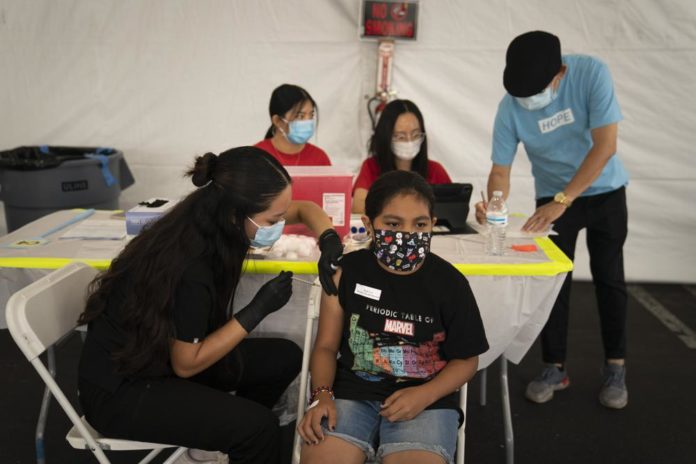
The COVID-19 vaccine is safe for children and presents the best way to get past the inconveniences brought by the pandemic, Arizona doctors said as they look to reassure parents ahead of anticipated approval by the federal government.
While most children who contract COVID-19 get only minor symptoms, doctors said some experience major complications, and the risk of severe disease is higher than the remote risk of serious vaccine side effects. With billions of doses of COVID-19 vaccines administered globally and extensive clinical trials in young people in the United States, the vaccine’s safety is clear, the doctors said.
Waiting until other children go first is a “calculated risk” for parents to take, said Dr. Richard Carmona, a former U.S. surgeon general who is advising Gov. Doug Ducey on his response to the pandemic.
“The risk of vaccination is infinitesimally small and minor compared to the potential magnitude of an illness that could kill you,” Carmona said.
Just under 560 people younger than 18 have died from COVID-19 in the United States, including 22 in Arizona, according to data from the Centers for Disease Control and Prevention. Others have developed a severe condition known as multi-symptom inflammatory syndrome in children, which often requires hospitalization.
“Not all kids do well,” said Dr. Sean Elliott, a Tucson Medical Center physician and medical director for infectious disease and immunizations for the Arizona Chapter of the American Academy of Pediatrics. “I have several in the hospital right now who are needing oxygen and they’re getting needle pokes.”
Arizona is expecting 225,000 child-sized vaccine doses once it’s given final approval, enough to give a first shot to about a third of the state’s 645,000 children ages 5 to 11.
The Food and Drug Administration on Friday approved kid-sized doses of vaccine made by Pfizer and its partner BioNTech, leaving just one regulatory hurdle before shots can be administered — approval from the CDC director. CDC advisers will make detailed recommendations Tuesday on which youngsters should get vaccinated, with a final decision by the agency’s director expected shortly afterwards.
“This has been studied,” said Dr. Wassim Ballan, a pediatric infectious disease specialist at Phoenix Children’s. “We have a long track of experience with this with the older age groups and we now have the data with that specific age group that’s proving it’s safe and effective.”
With children vaccinated, they won’t have to miss school due to quarantine if they get sick or are exposed to COVID-19, Ballan said.
Vaccinated children will protect their higher-risk relatives and slow the transmission of the virus, making it less likely to mutate in ways that render the existing vaccines ineffective, the doctors said.
A Pfizer study of 2,268 schoolchildren found the vaccine was nearly 91% effective at preventing symptomatic COVID-19 infections, based on 16 cases of COVID-19 among kids given dummy shots compared to just three who got vaccinated.
The FDA ultimately assessed more children — 3,100 — who received the kid dosage to conclude it was safe. Youngsters experienced similar or fewer temporary reactions — such as sore arms, fever, or achiness — than teens experience.
But the study wasn’t large enough to detect any extremely rare side effects, such as the heart inflammation that occasionally occurs after the second full-strength dose, mostly in young men and teen boys. It’s unclear if younger children getting a smaller dose also will face that rare risk. FDA pledged Friday to keep a close watch.
Don Herrington, acting director of the Arizona Department of Health Services, has said pediatric vaccinations will be available through retail pharmacies and more than 900 providers such as pediatricians and community health clinics. Special vaccination clinics will also be arranged in conjunction with schools and local health providers.
“We’ve got the supply chain. We’ve got the infrastructure of people to give the vaccines,” Carmona said. “All of the structure is in place. Now we need a willing population to step up and get the vaccine.”
Republished with the permission of the Associated Press.














